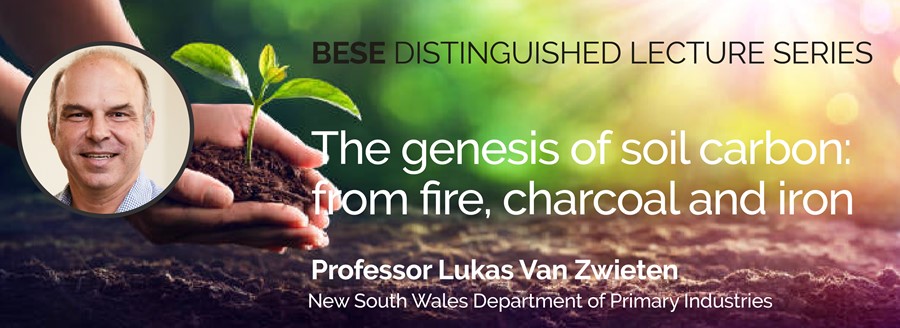
Monday, November 27
11:00 a.m. – 12:00 p.m.
Auditorium 2&3 and Zoom
The genesis of soil carbon: from fire, charcoal and iron
By Lukas Van Zwieten. New South Wales Department of Primary Industries
Abstract
There is increasing pressure from society, businesses and governments to increase the storage of carbon in farming soils (for example, the “4 per mille” initiative) to offset human-made greenhouse gas emissions. But can this be realistically achieved, and do we (the science community and farmers alike) understand how to do this? The genesis of Soil Organic Carbon (SOC), as organic matter, is a complex interplay between inputs, stabilization and/or priming of new and existing soil organic matter, and physical losses (leaching, erosion). The traditional understanding of “new” C preservation as SOC is through selective preservation, which favors more molecularly diverse organic matter; spatial inaccessibility, where the occlusion or incorporation of C within aggregates or phytoliths protects it from microbial mineralization; and protection via organo-mineral and organo-organic interfaces.
Lukas will discuss new data that critically interrogates our current knowledge of organic matter protection and turnover mechanisms. He will discuss the role of fire, pyrolysis and charcoal (biochar) in building SOC and, importantly, the role of iron (Fe) minerals and how the “rusty sink” may be manipulated to control C turnover processes. Fe-mediated SOC protection, i.e., by Fe oxides, (hydr)oxides and (oxy)hydroxides), has traditionally been recognized as occurring via adsorption, co-precipitation or aggregation processes. However, the electron transfer during the cycling between Fe(II) and Fe(III) influences both sequestration and mineralization processes, and opportunities exist to further understand and exploit these mechanisms. Importantly, an understanding of both edaphic controls and keystone microbiota that drive these processes is generally lacking and will be examined.
Finally, Lukas will describe some strategies and mechanisms for fostering the genesis of soil organic matter to deliver productive, fertile Anthrosols from soils that currently have a low SOC storage ceiling.
About the speaker
Lukas completed a Ph.D. at the University of Sydney in 1995 and then joined the New South Wales Department of Primary Industries (a state government department in Australia) where he is now a senior principal research scientist. He is a program leader in the Soil Cooperative Research Centre and adjunct professor at Griffith University and Southern Cross University. His research focus includes C and N cycling, and how this relates to soil carbon storage (for climate mitigation/adaptation, productivity and resilience), unraveling soil rhizosphere and microbial processes. He is a Highly Cited Researcher (2018-2020) with over 200 published papers, including works in Nature Climate Change and Nature Communications.

